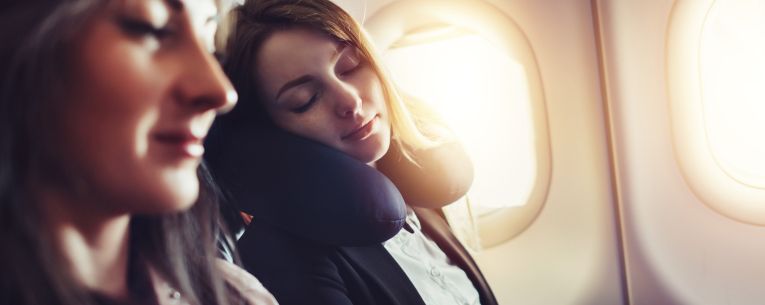If you're an experienced traveler, you know there's jet lag—and then there's jet lag. If you're traveling from L.A. to New York, for instance, you'll have a hard time knowing when it's lunchtime. If you're traveling from L.A. to Tokyo, you'll have a hard time even existing.
Jet lag symptoms include sleep disturbance, fatigue, irritability, digestive upset and feelings of fuzziness or fogginess. “Without any change in routine, the human body will adjust to approximately one hour of change in time per day,” explains Dr. Eugene Delaune, MD. “This means that without making some effort, it can take travelers over a week to fully adjust to a new time zone when flying across an ocean.”
Dr. Delaune is one of the talented medical professionals who advises Allianz Partners’ Assistance Team on critical medical decisions: managing emergency medical evacuations, providing referrals to local medical providers, and overseeing ongoing medical monitoring for ill or injured customers. Trained by the U.S. Air Force, Dr. Delaune served as a flight surgeon and later as a Critical Care Air Transport Team member, making him uniquely qualified to offer tips to help minimize the effects of jet lag. Here, he shares some tips to help you avoid jet lag.
How to avoid jet lag when flying east
Begin adjusting your sleep routine several days before you depart. Try to get up earlier and go to bed earlier each day. The Timeshifter jet lag app will create a personalized plan for you with recommended times to sleep, get light exposure, consume caffeine and take melatonin.
Here's another jet lag tip: Trick yourself. As soon as you arrive at the airport, set your watch or phone to your destination time, and live by that time. If it says 6 a.m., have breakfast. If it says 10 p.m., try to sleep. Wearing blue-blocker sunglasses can help fool your body into thinking it's night.
While flying, drink as much water (or juice/herbal tea) as possible, and avoid alcohol. Adjusting your meals can help reset your body clock, too. That means avoiding food during nighttime hours (destination time) to let your blood sugar drop, as it normally does during sleep, then following that fast with a healthy breakfast.1
If you’re on an overnight flight, try to sleep as much as possible during the flight.
How to avoid jet lag when flying west
In the days before you travel, try to stay up a little later each night and stay in bed longer each morning.
Avoid sleeping during the flight, if possible.
As for flying east, drink lots of water and avoid alcohol, which will dehydrate you and interrupt your sleep.
Jet lag remedies for after you arrive
The number one rule for avoiding jet lag once you arrive: Don't sleep. Even if you're so tired that you feel like you might collapse onto the baggage carousel and be whisked away into the innards of the airport, have another coffee and stagger on.
That's easier said than done, though. That's why, if you're visiting friends, you should ask your hosts to help you adjust. When you arrive in London at 5 p.m. local time, but your body still thinks it's noonish, having your friends usher you to the local pub for dinner can set you straight.
When it’s time to go to bed, taking a sleep aid such as Benadryl or a benzodiazepine prescribed by a physician might be helpful to avoid waking up in the middle of the night.
Many travelers advise taking melatonin, a hormone your body uses to regulate sleep. You can try a dose after dark on the day you travel and for the first few days you arrive, according to WebMD.2 Talk to your doctor first, however.
Close the blinds! A dark environment during periods of sleep and a bright environment when awake will help reset the body’s internal clock.
If you wake up in the middle of the night, you should stay in bed and remain inactive. Try reading a book or meditating until you are able to fall back asleep or the sun rises.
Once you wake up the next day, get some sun. "Bright light exposure is the most powerful way to cause a phase shift — an advance or delay in circadian rhythms," Scientific American explains.3 In one study, researchers found that they successfully shifted people's circadian rhythms by 2 hours by exposing them to early-morning bright light for three days. If you traveled west, expose yourself to morning sunlight and avoid afternoon sun; if you traveled east, do the reverse.
If all else fails, just decide to make the most of your jet lag. You could time your arrival in Paris to the Nuit Blanche (White Night) celebration, when the city stays awake all night to enjoy art, theater and dance performances. Or, if you find yourself unwillingly awake at 5 a.m. in Sydney, get up, go out and watch the sun rise spectacularly behind the Sydney Opera House.
Why you need travel insurance for international trips
Whenever you cross a few time zones, you should protect your trip—and yourself—with travel insurance. Look for a plan with:
- Emergency medical and dental benefits to reimburse you for the cost of eligible medical care if you experience a serious illness, injury, or medical condition.
- Emergency transportation benefits to pay for medically necessary transportation to the hospital (and back home) in case of a serious covered medical emergency.
- Trip cancellation and interruption benefits to reimburse your prepaid, non-refundable trip expenses if you have to cancel or interrupt your trip due to one of the covered reasons named in your plan. (The Cancel Anytime upgrade reimburses 80% of your unused, pre-paid, non-refundable trip costs if you cancel your trip for almost any unforeseeable reason your plan does not already cover.)
- Travel delay benefits to cover your lodging and meals during a covered delay (up to the maximum limit in your plan).
- Baggage delay benefits to you for the purchase of essential items (like clothing and toiletries) during a covered baggage delay.
- Baggage loss/damage benefits to reimburse you for lost or damaged possessions in your baggage.
Read more: The Simple Guide to International Travel Insurance Benefits
Get a quote for travel insurance for your next adventure!
Related Articles








Share this Page